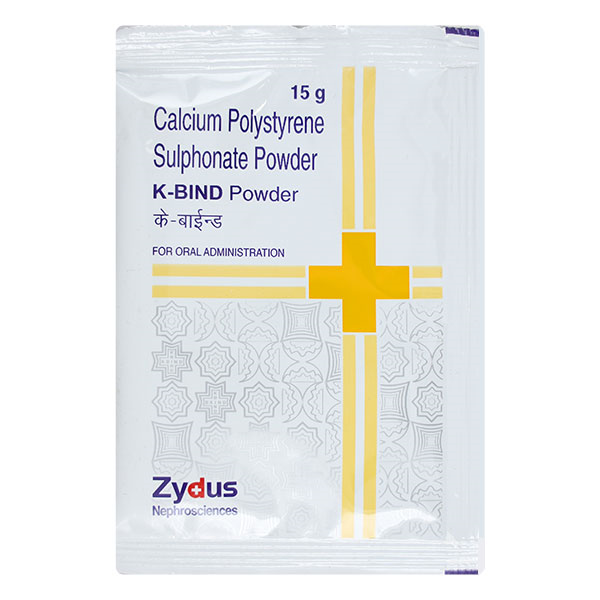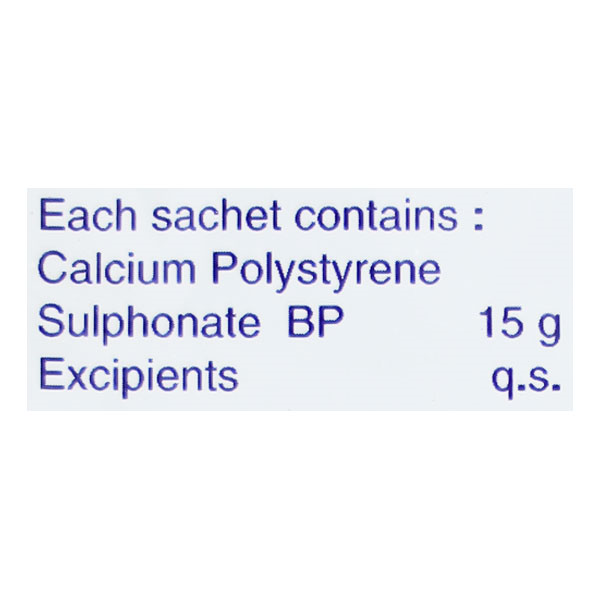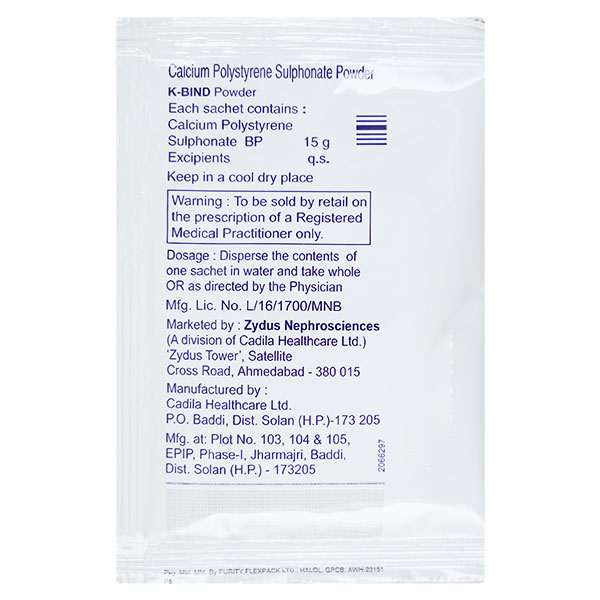K Bind Powder 15gm
Calcium Polystyrene Sulphonate 15 gm
₹ 143.00
₹159
(Inclusive of all taxes)
-

No Warranty
-

COD Avilable
-

Non Returnable
-

cancelable
About this item
INTRODUCTION ABOUT K BIND POWDER
K BIND POWDER contains Calcium Polystyrene Sulphonate which belongs to the group of medicines called Ion Exchange Resins. It is used to manage increased potassium levels in blood (hyperkalemia) due to acute and chronic renal failure that occurs after certain conditions. K BIND POWDER is also used in patients with hyperkalemia associated with anuria, severe oliguria (condition marked by low urine output) and in patients requiring dialysis. Hyperkalemia is a condition of abnormally raised levels of potassium in the blood, generally characterized by symptoms such as abdominal pain, diarrhoea, chest pain, irregular heartbeat, muscle weakness, numbness, nausea, and vomiting.
Avoid taking K BIND POWDER with orange juice or other fruit juices that are known to raise the blood potassium levels. It is not recommended for use if you are allergic to calcium polystyrene sulfonate and in patients with other conditions such as bowel obstruction or blocked intestine, thyroid problems and high blood calcium levels. K BIND POWDER should be used with caution if you have breathing or chest problems, kidney or heart problems.
K BIND POWDER should be used with caution during pregnancy and breastfeeding. It should be used with caution in children and adolescents (below 18 years of age). Consult your doctor before taking. The common side effects associated with the use of K BIND POWDER are tiredness, confusion, muscle weakness, muscle cramps, altered heart rate, nausea and vomiting. Contact your doctor if any of the side effects worsens.
USES OF K BIND POWDER
It is used to manage:
- hyperkalemia due to acute and chronic renal failure
- hyperkalemia (associated with anuria, severe oliguria and in patients requiring dialysis)
HOW K BIND POWDER WORKS
K BIND POWDER works by releasing calcium ions in the stomach which binds to hydrogen ions and it gets exchanged with free potassium ions in the large intestine, that gets eliminated with the faeces along with the excess potassium ions thereby resulting in reduced potassium levels in the body.
DIRECTIONS FOR USE
Take K BIND POWDER as advised by your physician. Avoid using orange juice or other fruit juices. Your doctor will decide the correct dose and duration for you depending upon your age, body weight and disease condition.
SIDE EFFECTS OF K BIND POWDER
COMMON
- tiredness
- confusion
- muscle weakness
- muscle cramps
- altered heart rate
- excessive thirst, frequent urination
- abnormal eye movements, convulsions, weakness
- nausea
- vomiting
- constipation
UNCOMMON
- loss of appetite
- diarrhoea
- stomach upset
- abdominal pain
- gut blockage
- stomach ulcer
- intestinal obstruction
RARE
- large, dry and hard stool (particularly in children following rectal administration)
- undigested aggregates in the intestine
- intestinal perforations (due to cell damage of large intestine)
Stop taking K BIND POWDER and contact your doctor if you experience any of the following side effects:
- severe stomach or rectal pain
- severe bloating and constipation
- severe nausea and vomiting
- black, bloody or tarry stools
- coughing with blood and vomiting (that looks like coffee grounds)
- signs of allergic reactions such as sneezing, itchy nose, wheezing, itchy and red skin
- stomach irritation and bleeding
- faecal impaction (hard lump of stool causing liquid stool, stomach pain)
- signs of bowel obstruction and perforation such as cramping, severe stomach pain, chills, fever
HOW TO MANAGE SIDE EFFECTS
Constipation
Try to eat more high-fibre foods such as fresh fruit, vegetables, cereals and drink plenty of water. Try doing exercise regularly (going for a daily walk or run). If this does not help, inform your doctor for receiving alternate managements for constipation.
Diarrhea
Drink lot of fluids, such as water to keep yourself hydrated. Try to avoid taking any medicine on your own to manage diarrhoea and consult your doctor if the symptom gets worse.
Nausea And Vomiting
Stick to simple meals. Avoid eating oily, fried or spicy foods. Do not sleep or lie down immediately after eating. Consult your doctor if the symptom gets worse.
Tiredness
Drink plenty of fluid and eat balanced diet and frequent meals. Do regular minimal exercise and follow regular sleep schedule. Consult your doctor if the symptom does not improve.
WARNING & PRECAUTIONS
PREGNANCY
Use with CautionK BIND POWDER should be used with caution in pregnant women and in women who are planning to get pregnant. Consult your doctor before taking K BIND POWDER.
BREASTFEEDING
Use with CautionK BIND POWDER should be used with caution in breastfeeding mothers. Consult your doctor before taking K BIND POWDER.
DRIVING AND USING MACHINES
Use with CautionDo not drive or operate machines if K BIND POWDER impairs your ability to drive or operate machines. Consult your doctor before taking K BIND POWDER.
KIDNEY
Use with CautionK BIND POWDER should be used with caution in patients with kidney problems such as renal insufficiency, chronic kidney failure and also in patients undergoing dialysis. Consult your doctor before taking K BIND POWDER.
ALLERGY
ContraindicatedK BIND POWDER is not recommended for use if you are allergic or have a history of allergy to Calcium polystyrene sulfonate, or any other ingredients of this medicine.
LUNGS
Use with CautionK BIND POWDER should be used with caution in patients with breathing, lung or chest problems. Consult your doctor before taking K BIND POWDER.
HEART DISEASE
Use with CautionK BIND POWDER should be used with caution in patients with heart problems. Consult your doctor before taking K BIND POWDER.
USE IN PEDIATRICS
Use with CautionK BIND POWDER should be used with caution in children and adolescents (below 18 years of age). It should be used with extreme caution when indicated for use in premature or low birth weight infants. Consult child’s doctor for advice.
USE IN GERIATRICS
Use with CautionK BIND POWDER should be used with caution in elderly patients (aged above 65 years). Consult your doctor before taking K BIND POWDER.
OTHERS
K BIND POWDER is not recommended for use if you have:
- low levels of potassium in the blood
- conditions associated with high blood calcium levels such as hyperparathyroidism (thyroid disease), or multiple myeloma, sarcoidosis or metastatic carcinoma
- obstructive bowel disease
Before taking K BIND POWDER, inform your doctor if you:
- have history of intestinal disease or surgery
- are under immunosuppressant therapy
- have severe burns
- have constipation
- have gastroparesis (delayed gastric emptying)
- have low blood volume due to dehydration or bleeding.
- have signs of electrolyte imbalance (condition marked by loss of large amount of body fluids)
INTERACTIONS
A. Drug-Drug Interactions:
Before taking K BIND POWDER, inform your doctor, if you are taking any of the following medicines:
- medicines used to manage heart problems (ex. Digitalis)
- medicines used for acid reflux or constipation such as non-absorbable cation-donating antacids and laxatives (ex. magnesium hydroxide, aluminium carbonate)
- medicines used to manage heart burn or peptic ulcer (ex. aluminium hydroxide)
- medicines used to manage underactive thyroid (ex. levothyroxine, thyroxine)
- medicines used to manage depression (ex. Lithium)
- calcium (used as a calcium supplement in diet)
B. Drug-Food Interactions:
Avoid taking K BIND POWDER with orange juice or other fruit juices that are known to raise the blood potassium levels.
Overdosage:
If you or anyone else accidentally takes too much of K BIND POWDER, consult your doctor immediately or visit the nearby hospital. Overdosage symptoms of K BIND POWDER are irritability, confusion, muscle weakness, diminished reflexes, paralysis, inability to concentrate, delayed thought process, breathing problems, fast/pounding heartbeat, muscle cramps, sleep apnea (serious sleep disorder) and irregular heartbeat.
SYNOPSIS
| Drug | : | Calcium polystyrene sulphonate |
| Pharmacological Category | : | Ion exchange resins |
| Therapeutic Indication | : | Hyperkalaemia |
| Dosage Forms | : | Powder, Sachet |
MORE INFORMATION
- Keep the medicine out of reach of children
- Store K BIND POWDER at room temperature
0 Review Of Product K Bind Powder 15gm















